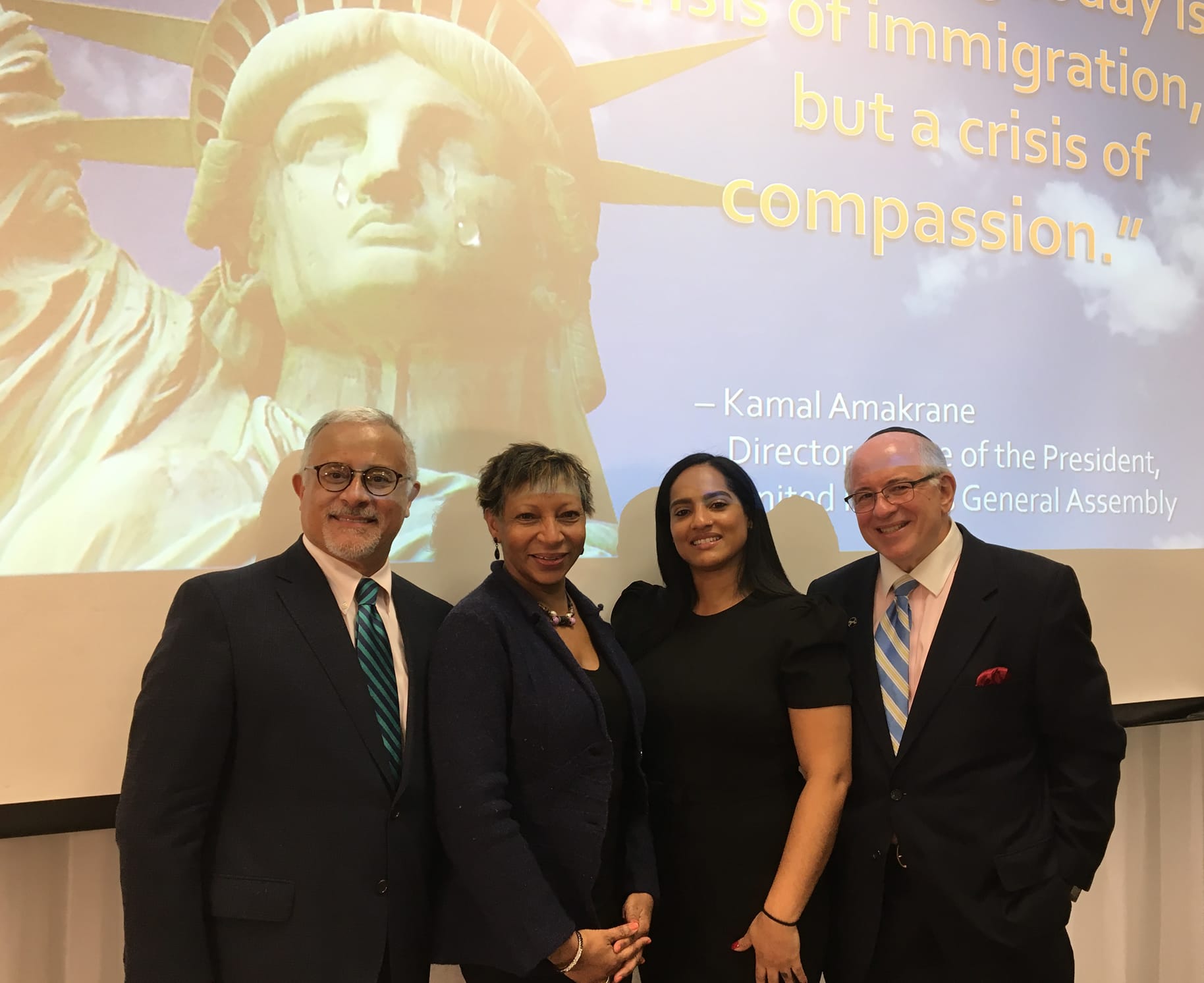News
Touro College Graduate School of Social Work Addresses Forgotten Citizens
Citizen-Children with Undocumented Parents Live by Two Rules: Don’t Talk and Sit Still

New York, N.Y. – Children of undocumented parents live in fear that their parents will be arrested. They are hypervigilant to their surroundings. They almost always fear the Immigration and Customs Enforcement (ICE) raid and there’s never a respite from the dread of what might happen, said Dr. Luis H.Zayas, dean and Robert Lee Sutherland Chair in Mental Health and Social Policy at the Steve Hicks School of Social Work and Professor of Psychiatry, University of Texas at Austin.
Dr. Zayas spoke recently at the Touro College Graduate School of Social Work about the heart-wrenching, daily struggles that undocumented immigrants and their U.S.-born children endure in the face of potential parental deportation.
"If a parent comes home late, they fear they have been deported. They experience anxiety, depression, social isolation and withdrawal; behavioral and attention problems; and clinical levels of behavioral disorders. They live by two rules: Don't talk and sit still,” he said. “For every two undocumented immigrants deported, one child is affected.”
The author of “Forgotten Citizens: Deportation, Children and the Making of American Exiles and Orphans,” (Oxford University Press, 2017), Dr. Zayas said 4.1 million U.S. citizen-children live with at least one undocumented parent, according to estimates of 2009-2013 census data; 5.9 million live with an undocumented family member, according to estimates of 2010-2014 census data; and roughly half a million experienced the apprehension, detention, and deportation of at least one parent between 2011 and 2013, based on ICE data.
Constantly concerned that their undocumented parents will be required to return to their native country, a child will struggle not to draw attention to themselves or their family. But with their unrelenting angst, they are prone to selective mutism – speaking only to family; feelings of shame or guilt; and suicide attempts, said Dr. Zayas.
Fear Knock on Door Could Be ICE
“You seldom see the child of an undocumented immigrant throwing a tantrum in Wal-Mart – simply because they can’t,” he said. “They know they will create a problem for their parents and must be hyper-vigilant, since a knock on their door could be ICE.”
Furthermore, children who leave the U.S. with deported parents have no guarantee that they will be happy – or even healthy in their new home. In their parents’ native towns and villages, they may face language and cultural barriers, while health care and schooling may be non-existent, and food supplies may be limited. Remaining in the U.S. with extended family members is no panacea either because they stand to suffer from the loss of their parents’ daily presence, love and attention, he said.
To make a compelling case for undocumented immigrant parents to remain in the U.S. mental health professionals must prove that deportation will result in an “exceptional and extremely unusual hardship” for the children, Dr. Zayas said. “We just have to take lemons and make lemonade.”
Other Speakers Address Trauma Interventions and the Immigration Experience
Other speakers at the Touro social work symposium, titled “Immigrants and Refugees in America: How Social Work Makes a Difference", included Dr. Nadja Graff, Touro’s vice president, Division of Graduate Studies; Dr. Steven Huberman, dean of Touro Graduate School of Social Work; Allison Bobick, director of student advancement; Rosa Bramble, a licensed clinical social worker who conducts psycho-social evaluations and provides testimony for immigration-related hearings, political asylum and trauma-informed interventions; and Leidy Deleon, a MSW student at Touro who immigrated from the Dominican Republic.
Bramble, a native of Venezuela, spoke about the myriad hardships that asylum seekers experience during pre-migration, such as war and poverty; during migration, such as hunger, death of traveling companions, and sexual and physical abuse; during resettlement; and during post-migration, such as lack of social and community support, substandard living conditions and social isolation. As a result, asylum seekers typically suffer from post-traumatic stress disorder, but are unable to surmount barriers to accessing mental health services.
Deleon shared her childhood struggles as an immigrant who longed for her loving extended family and friends back home. “The language barrier made it difficult for me to establish relationships, and because I didn’t speak the language, I was considered less smart – even though I was an excellent student back home,” Deleon said.
Her classmates, she recalled, made her feel like “an outsider”, which exacerbated her low self-esteem. “It was humiliating,” said Deleon. But thanks to her school’s English as a Second Language program, as well as her own determination to succeed, she became valedictorian of the 8th grade class.
As a social worker, Deleon said she wants “to be the voice of those who cannot speak for themselves,” adding that “despite all of my challenges, I am thankful and grateful for all the opportunities I have been given while living in the U.S.”
Dean Huberman said that he has been personally involved in the refugee cause, volunteering with his synagogue to help resettle an Afghan family with 11 children. “We can all do our part. How we treat the stranger is the ultimate test of our humanity.”
Media Contact
Barbara Franklin
Director of Communications
646-565-6530
barbara.franklin@touro.edu
About the Touro College and University System
Touro is a system of non-profit institutions of higher and professional education. Touro College was chartered in 1970 primarily to enrich the Jewish heritage, and to serve the larger American and global community. Approximately 18,000 students are currently enrolled in its various schools and divisions. Touro College has 30 campuses and locations in New York, California, Nevada, Berlin, Jerusalem and Moscow. New York Medical College; Touro University California and Touro University Nevada; Touro University Worldwide and its Touro College Los Angeles division; as well as Hebrew Theological College in Skokie, Ill. are separately accredited institutions within the Touro College and University System. For further information on Touro College, please go to: www.touro.edu/news

